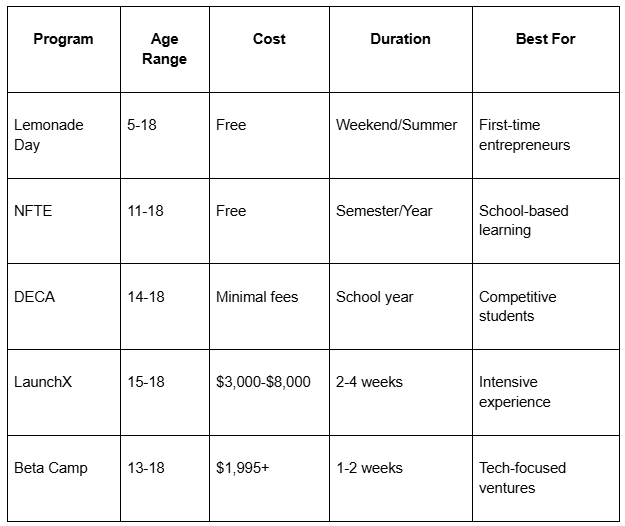Youth Entrepreneurship Programs That Turn Big Ideas Into Real Businesses
Ten-year-old Emma wasn’t just selling lemonade last summer-she was running a business empire. What started as a simple lemonade stand turned into something that amazed the whole neighborhood. She researched her competition (the ice cream truck), surveyed customers about their favorite flavors, and even created a loyalty card system. By the end of summer, Emma had saved enough money for her first laptop and learned more about business than most adults know.
Emma’s story isn’t unique. She’s part of a growing generation of young entrepreneurs who are discovering that business skills can be learned, practiced, and mastered-starting with something as simple as a lemonade stand.

These programs attract youth from a diversity of backgrounds and experiences, ensuring that entrepreneurship is accessible and inclusive for all. Youth entrepreneurship programs are designed to cultivate young innovators, encouraging creative thinking and problem-solving skills that help shape the next generation of entrepreneurial leaders.
Key Takeaways
- Youth entrepreneurship programs provide hands-on learning experiences that teach kids essential business skills, from market research to financial literacy, fostering an entrepreneurial mindset from a young age.
- These programs cater to a wide age range, offering accessible options like Lemonade Day for younger children and intensive bootcamps such as LaunchX and Beta Camp for high school students.
- Mentorship, community support, and key partnerships play a crucial role in helping young entrepreneurs overcome challenges, build confidence, and develop resilience.
- Participation in youth entrepreneurship programs not only prepares young people for potential business ventures but also equips them with transferable skills valuable for future academic and career success.
What Are Youth Entrepreneurship Programs?
Youth entrepreneurship programs are structured learning experiences that teach kids the fundamentals of starting and running a business. Think of them as the bridge between classroom learning and real-world business experience.
Instead of just reading about math, kids apply it by calculating profit margins. Rather than writing essays about abstract topics, they create marketing materials for their own ventures.
These programs combine entrepreneurship education with hands-on practice, mentorship from business leaders, and access to resources that help young people turn their big ideas into reality. Teachers play a crucial role in delivering these programs, fostering entrepreneurial skills, and creating an innovative learning environment.
Key partnerships with organizations and stakeholders provide essential resources and mentorship, further strengthening these initiatives. Youth entrepreneurship programs help advance the broader entrepreneurship ecosystem by promoting innovation and developing future leaders.
The goal isn’t necessarily to create the next generation of Fortune 500 CEOs (though that might happen). It’s about developing entrepreneurial thinking, creative problem solving, and the confidence to tackle challenges head-on, all while supporting the mission to inspire and prepare future business leaders.
Programs like Lemonade Day have made entrepreneurship accessible to families everywhere by providing free curriculum, tools, and guidance that help kids start their first business-literally over a weekend. Since the 1980s, over 1.4 million students have participated in various youth entrepreneurship programs across the country, learning everything from financial literacy to leadership skills.
The beauty of these programs is that they meet kids where they are. A five-year-old can learn about money and customer service through a lemonade stand, while high school students can develop sophisticated business plans and pitch to real investors.
Developing an Entrepreneurial Mindset
Picture this: your kid's got a card table, some cups, and a big pitcher of lemonade. They're not just selling drinks-they're building something way bigger. That entrepreneurial spark? It starts right here, at that little stand on the corner.
Building an entrepreneurial mindset isn't about teaching kids to become the next big CEO. It's about helping them see problems as puzzles to solve. When life throws them curveballs, they'll think, "How can I make this work?" instead of giving up.
Take that lemonade stand. When it's too hot and nobody's walking by, does your kiddo pack up and go inside? Or do they grab some ice, maybe add a "Free Ice Water" sign, and figure out how to bring customers over?

That's entrepreneurial thinking in action.
Here's where parents and mentors come in-you're like the secret ingredient that makes everything click. You don't need a business degree to help your kid think like an entrepreneur. You just need to ask the right questions and cheer them on when they try something new.
When your child's lemonade stand isn't making much money, don't rush in to fix it. Instead, sit down together and brainstorm. "What do you think happened today? What could we try differently tomorrow?" Maybe they'll decide to move to a busier street, or create a special lemonade recipe, or even team up with the neighbor kids.
And when things don't go as planned? That's not failure-that's learning gold.
Every entrepreneur knows that the best ideas often come from the "oops" moments. Your job is to help them see that trying again isn't just okay, it's exciting.
These lemonade stand lessons don't just prepare kids to run businesses someday. They're building life skills that'll help them tackle anything. Problem-solving, creativity, bouncing back from disappointment-these are the tools that'll serve them whether they become teachers, doctors, artists, or yeah, maybe even business owners.
With a little encouragement and the right opportunities to practice, today's kids can develop that entrepreneurial spirit that'll help them turn any big idea into something real. And it all starts with something as simple as a cup of lemonade and the confidence to give it a try.
Top Youth Entrepreneurship Programs Your Family Should Know About
The landscape of youth entrepreneurship education ranges from free community programs to intensive summer bootcamps. Some happen in schools, others in community centers, and many can be done from your living room. Here’s what’s out there for families ready to dive in.
Free Programs That Get Kids Started Today
- Lemonade Day stands out as the most accessible entry point for families. This nationwide program provides completely free curriculum, business planning tools, and mentor resources that guide kids through launching their first business. Kids as young as five can participate, and families can literally get started this weekend by downloading materials from our website. The program’s genius lies in its simplicity-using the classic lemonade stand as a vehicle to teach fundamental business concepts like cost analysis, pricing strategies, and customer service.
- NFTE (Network for Teaching Entrepreneurship) has been helping students in underserved communities for over 30 years, serving more than 1.4 million young people. Their programs operate in schools and community centers, focusing on real-world business skills while building confidence and leadership. What makes NFTE special is their commitment to reaching students who might not otherwise have access to entrepreneurship education.
- DECA chapters exist in schools nationwide and have been cultivating young entrepreneurs for over 75 years. The aim of DECA is to inspire and prepare students to become community-minded business leaders through career and leadership experiences. This program combines classroom learning with competitive events where students present business ideas, solve marketing challenges, and network with industry professionals. If your school has a DECA chapter, it’s an excellent way for students to develop entrepreneurial skills alongside their peers.
- 4-H Entrepreneurship Programs operate in communities across the country, offering hands-on business experiences through local clubs. These programs often focus on agriculture-related businesses but have expanded to include technology, retail, and service ventures.
Premium Programs for Serious Young Entrepreneurs
For families ready to make a bigger investment in their child’s entrepreneurial education, several intensive programs offer accelerated learning and mentorship.
- LaunchX runs summer programs at prestigious universities where high school students work in teams to launch real startups. These programs are led by mentors and instructors with deep expertise in instructional design, emerging technologies, and entrepreneurship, ensuring students receive guidance from leaders in the field. Students are trained with essential entrepreneurial skills and methodologies through hands-on projects and targeted instruction, preparing them to develop, launch, and scale real businesses. These intensive experiences cost between $3,000-$8,000 but provide access to top-tier mentors, seed funding opportunities, and a network of like-minded young entrepreneurs. Students leave with functioning businesses and the skills to scale them.
- Beta Camp offers bootcamp-style programs focusing on technology entrepreneurship. Their instructors bring expertise in modern educational needs and tech innovation, providing students with specialized knowledge and support. Students are trained in entrepreneurial thinking, business model development, and real-world problem solving through immersive, project-based learning. Their alumni have impressive track records, with some raising between $150,000 and $1.5 million in funding for their ventures. The program costs around $1,995 for educator certificates and more for intensive student experiences.
- Acton Academy provides year-round entrepreneurship-focused education with a learn-by-doing philosophy. Students run real businesses as part of their regular curriculum, selling products and services to their community while mastering traditional academic subjects.

What Your Child Will Actually Learn
Let’s get concrete about what happens when kids dive into entrepreneurship education. Using the lemonade stand as our example (because it’s the perfect starter business), here’s what your child will master:
Market Research becomes as simple as walking around the neighborhood. Kids learn to survey potential customers:
- “What’s your favorite lemonade flavor?”
- “How much would you pay for a cup?”
- “When do you get thirstiest?”
This teaches them to base decisions on data rather than assumptions-a skill that translates to every area of life.
Financial Literacy gets hands-on fast. Kids calculate startup costs (lemons, sugar, cups, table rental from mom), determine pricing that covers expenses and generates profit, and track daily earnings. Through Lemonade Day’s curriculum, a child might discover that selling lemonade for 50 cents per cup when their cost is 25 cents gives them a 50% profit margin-suddenly, math has real meaning. These financial literacy skills will last a lifetime.

Problem-Solving happens naturally when challenges arise. What happens when it rains on lemonade stand day? Smart kids pivot to indoor sales, offer delivery service, or reschedule their grand opening. When one young entrepreneur faced this exact scenario, she moved her operation to the local grocery store entrance (with permission) and sold even more than she would have on her corner.
Communication Skills develop through every customer interaction. Kids learn to greet customers, explain their product, handle complaints, and even negotiate with suppliers (also known as parents). One Lemonade Day participant created a “customer feedback card” and discovered that people wanted sugar-free options-so she added water infused with fresh fruit to her menu.
Resilience and Growth Mindset get tested when sales are slow or customers aren’t interested. Instead of giving up, young entrepreneurs learn to analyze what’s not working and try new approaches. Maybe the location isn’t right, the price is too high, or the marketing needs work. These experiences teach kids that failure is just information-not a reason to quit.
The key insight that Lemonade Day emphasizes is that these skills transfer everywhere. A child who learns to handle rejection from potential lemonade customers develops confidence for job interviews, college applications, and life challenges.
How to Choose the Right Program for Your Family
Choosing the right youth entrepreneurship program starts with understanding your child’s personality, interests, and your family’s circumstances. Here’s a framework for making this decision together.
Start with your child’s age and interest level. Elementary kids (ages 5-10) thrive with hands-on, immediate experiences like Lemonade Day. Middle schoolers (11-13) can handle more structured programs like NFTE while still enjoying the creativity of launching their own ventures. High school students (14-18) might be ready for intensive experiences like LaunchX or competitive programs like DECA.
Consider your family’s time and budget constraints. Free programs like Lemonade Day require minimal financial investment but need parental guidance and enthusiasm. Premium programs offer professional instruction and mentorship but require significant financial commitment. Ask yourself: “Are we testing the waters or diving deep?”
Think about your child’s learning style. Does your kid learn better through hands-on experience or structured classroom instruction? Some children thrive in competitive environments (DECA competitions), while others prefer collaborative, supportive settings (community-based programs). Virtual programs work well for self-motivated learners, while in-person experiences suit kids who need more guidance and social interaction.
Evaluate local resources and community support. Research what’s available in your area. Many schools offer entrepreneurship programs or clubs that provide built-in peer groups and teacher support. Community organizations often partner with national programs to provide local mentorship and resources.
Here are discussion questions for families to explore together:
- What business ideas are you most excited about?
- Do you prefer working alone or with a team?
- Are you interested in competing with other young entrepreneurs?
- How much time can we realistically commit to this?
- What would make this experience most valuable for you?
Decision-making framework: Start small with accessible programs like Lemonade Day to gauge interest and aptitude. If your child shows sustained enthusiasm and develops basic skills, consider more intensive options. Remember, the goal is building confidence and capabilities-not necessarily creating the next tech unicorn.
Overcoming Challenges in Youth Entrepreneurship
Starting your own business as a kid? It's exciting, but let's be honest-it comes with its fair share of bumps along the way. Young entrepreneurs often run into challenges that might seem pretty big at first. Maybe you're wondering how to get the money to buy supplies, or you're not sure who to ask for advice, or you're trying to figure out how to write a real business plan. But here's the thing: those challenges aren't roadblocks-they're actually amazing chances to learn and grow into the kind of business leader you want to become.
The secret sauce?
Having the right people in your corner.
There are tons of organizations and programs out there that want to help kids succeed, especially those who might not have all the same opportunities. They offer training that actually makes sense, funding to get you started, and guidance from people who've been where you are.
These partnerships give you real tools you can use, plus they connect you with mentors who've walked this path before. These mentors can share advice, cheer you on when things get tough, and give you insights about what the business world is really like.
Teachers and community leaders play a huge role in helping kids develop that entrepreneurial spirit and the growth mindset to bounce back from setbacks. They create spaces where it's safe to try new ideas and get creative with problem-solving.
They help young people stick with it when things don't go as planned and figure out new ways to make their dreams work. When whole communities come together to support young entrepreneurs, amazing things happen. They help level the playing field so every kid-no matter where they come from-gets a real shot at chasing their business dreams and becoming confident, capable entrepreneurs.
Getting Started: Your Family’s First Steps
Ready to turn your family into entrepreneurial powerhouses? Here’s your action plan that transforms big dreams into real businesses.
Week 1: Have the “Big Dreams” Conversation Set aside dedicated family time to explore entrepreneurship together. Visit the Lemonade Day website and browse their free resources. Watch success stories with your kids and ask questions like “What problems do you notice in our community?” or “What would make your friends’ lives easier?” The goal isn’t to pressure your child into business ownership-it’s to spark curiosity about how businesses solve problems and create value.
Download Lemonade Day’s planning materials and flip through them together. Even if lemonade isn’t your kid’s thing, the business planning process applies to any venture. One family used these materials to help their daughter plan a dog-walking business, adapting the lemonade-specific content to her idea.
Week 2: Research and Explore Programs Based on your child’s age and interests, research 2-3 programs that might fit. Visit websites together, read success stories, and if possible, attend local information sessions or contact program coordinators with questions. This is also a great time to check if your child’s school offers entrepreneurship programs or if local community centers host business clubs.
Create a simple comparison chart with your child, listing programs, costs, time commitments, and what appeals to them about each option. This teaches decision-making skills while getting them invested in the choice.
Week 3: Launch a Mini-Business at Home Before committing to formal programs, test entrepreneurial waters with a small family business experiment. This could be a weekend lemonade stand, selling homemade cookies to neighbors, offering pet-sitting services, or creating and selling crafts. The goal is hands-on experience with the basics: planning, execution, and reflection.
Use this experience to practice key business concepts. Help your child calculate costs, set prices, track sales, and evaluate what worked well versus what they’d change next time. Document the experience with photos and notes-it becomes a valuable reference point for future ventures.
Week 4: Apply or Register for Your Chosen Program With real experience under your belt, apply to your selected program or register for Lemonade Day in your area. If you’re choosing a competitive program, use your mini-business experience as application material. For programs with waiting lists, apply early and consider backup options.
Create a family business journal to track your entrepreneurship journey. Include photos, revenue numbers, lessons learned, and goals for the next phase. This becomes a valuable tool for program applications and a wonderful family keepsake.
Family Discussion Prompts for Each Step:
- What excites you most about starting a business?
- What scares you most, and how can we prepare for those challenges?
- What business skills do you think would help you in school and life?
- How can our family support each other through this experience?
Measuring Success: How to Know Your Young Entrepreneur is Thriving
Success with your kid's lemonade stand isn't just about how much money they make or how many cups they sell-it's about watching them grow, learn new skills, and make their neighborhood a little brighter. So how can you tell if your young entrepreneur is really doing great with their lemonade business?
Look for growth in those important business skills like creative problem-solving, teamwork, and bouncing back from tough days. Can your kid figure out what to do when they run out of ice on a hot afternoon? Are they comfortable working with their siblings or friends, asking customers what they think, and learning from the days when sales are slow? These are awesome signs that they're developing that entrepreneurial spirit. What creative solutions has your child come up with at their lemonade stand?
Another great sign of success is watching them set goals, ask for startup money, and build relationships with customers and neighbors who become their biggest supporters. Whether they're planning how many lemons to buy, practicing their sales pitch, or just getting brave enough to try a new flavor, these moments show your young entrepreneur is on the right track.

Having access to programs like Lemonade Day and other entrepreneurship resources makes a huge difference in this journey, giving families the tools they need to turn that first "what if" moment into a real lemonade stand adventure.
Why Youth Entrepreneurship Programs Matter
Youth entrepreneurship programs play a vital role in empowering the next generation of innovators and business leaders. By providing young people with hands-on experiences, mentorship, and access to valuable resources, these programs nurture an entrepreneurial mindset that extends far beyond starting a business. They teach essential skills like creative problem solving, collaboration, resilience, and financial literacy - skills that prepare youth to thrive in any future endeavor.
Whether your child is just setting up a lemonade stand or launching a startup, the lessons they learn through these programs will build confidence and inspire them to tackle challenges with creativity and determination. With the support of educators, mentors, and a strong community, young entrepreneurs can transform their big ideas into real-world success stories.
Investing in youth entrepreneurship education is investing in a brighter, more innovative future. Encouraging young people to think like founders and co founders today ensures a generation ready to collaborate, innovate, and lead tomorrow’s world. So, take the first step to explore the programs available, support your young entrepreneur’s journey, and watch as they grow into the confident, capable leaders of the future.
Frequently Asked Questions
What age groups do youth entrepreneurship programs typically serve?
Youth entrepreneurship programs cater to a wide range of ages, from young children as early as five years old participating in simple ventures like lemonade stands, to high school students engaging in intensive startup bootcamps and business competitions.
Are youth entrepreneurship programs only for kids interested in starting a business?
No, these programs are designed to develop an entrepreneurial mindset and essential skills like creative problem solving, resilience, and collaboration, which are valuable in many areas of life beyond business ownership.
How can parents support their children in youth entrepreneurship programs?
Parents can support by encouraging their child’s creativity, asking thoughtful questions, helping with planning and reflection, and connecting them with resources and mentorship opportunities to build confidence and skills.
Are there free youth entrepreneurship programs available?
Yes, many programs like Lemonade Day and NFTE offer free curriculum and resources to make entrepreneurship education accessible to young people from diverse backgrounds and communities.
What benefits do young people gain from participating in entrepreneurship education?
Participants develop practical business skills, an entrepreneurial mindset, confidence, and transferable skills such as communication, financial literacy, and problem-solving, which prepare them for success in academics, careers, and life challenges.
back to blog
@LemonadeDayNational






